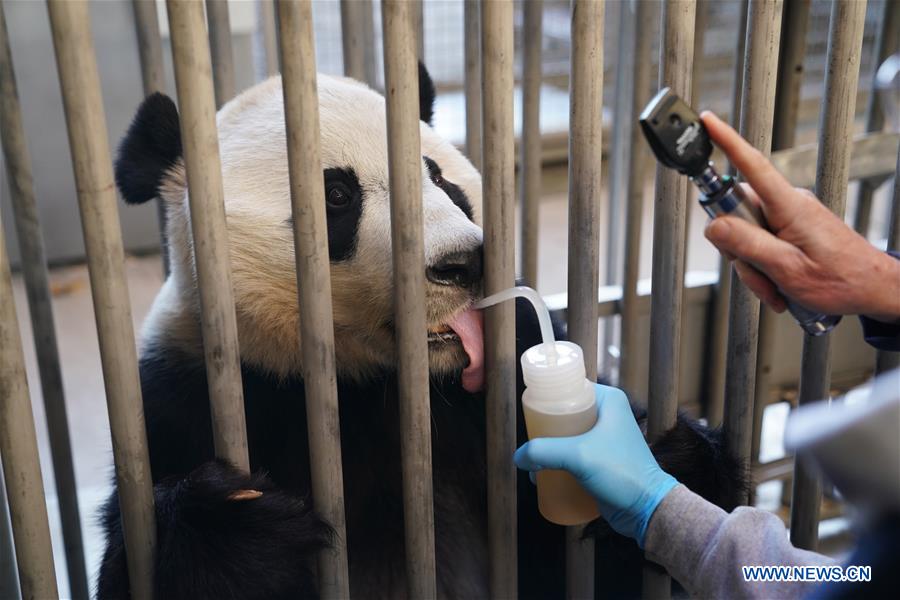
U.S.-born male giant panda Bei Bei has a health check at the Smithsonian's National Zoo in Washington D.C. on Nov. 13, 2019. (Xinhua/Liu Jie)
WASHINGTON, Nov. 13 (Xinhua) -- Putting his arm out, lying down and turning around were among the moves swiftly pulled off by U.S.-born male giant panda Bei Bei, when the Smithsonian's National Zoo in Washington D.C. conducted a health check for him on Wednesday.
Bei Bei, who is to depart to China next week, was also not shy about climbing upon a scale and holding still for a check of his weight.
Panda keeper Marty Dearie, with the lure of honey water, took Bei Bei through a series of different motions that help present different body parts for the zoo's chief veterinarian Dr. Donald Neiffer to look at or touch through the mesh in the enclosures in the last health check for the panda before his journey to China.
"He's a great patient," Dr. Neiffer told Xinhua.
"They work well with this stuff," Dearie said. "They're very easy to train cause they're so food motivated. They spend 13 to 16 hours a day eating," said the keeper.
When Bei Bei sat down and turned around, Neiffer was able to palpate him. "Oh, that feels good huh? Yeah, I like my back," the veterinarian teased.
He said this might help Bei Bei later in life, as his father Tian Tian has a little bit of a "sore shoulder" and is subject to laser therapy.
The health check on Wednesday was part of the zoo's preparation efforts ahead of Bei Bei's trip to China scheduled next Tuesday. Meanwhile, the zoo has started a week-long farewell party for the beloved giant panda.
According to a cooperative breeding agreement between the U.S. national zoo and the China Wildlife Conservation Association, all giant pandas born here return to China after their fourth birthday.
Bei Bei, the latest giant panda cub born at the zoo to parents Mei Xiang and Tian Tian, turned four on Aug. 22.
Neiffer said veterinarians at the zoo had a full examination on Bei Bei under anesthesia a few months ago. "At that time we took a series of radiographs, blood work. We had our nutrition staff come down and do a good health assessment on his muscle mass and his condition," he said.
Bei Bei is "very healthy," Neiffer said, noting that Wednesday's physical and visual examination allowed him to make sure Bei Bei was in good shape for his overseas trip.
Neiffer said giant pandas usually have an annual examination, but they get evaluated a lot more frequently than others. "It's no surprise. Everybody is always wondering what's up with the pandas. So they do get scrutinized a lot," he said.
Positive reinforcement training techniques are used to give pandas the opportunity to voluntarily participate in their own care and receive a reward for doing so, Neiffer said.
"It's not something you want to do the day an animal gets sick. It's something you do when the animal was very healthy and the animal is very engaged with the keeper staff and you build upon it," he said.
"Many of the things that we do, we actually hope we never have to utilize for a medical reason, but we have it "just in case," Neiffer said.
When Bei Bei moves back to China, would language be a problem? Not at all. "Most of the behaviors when I do them, I ask him with a hand cue, there's a hand cue involved and a verbal cue," Dearie said.
"My Chinese colleagues know all the same hand cues ... So that very quickly he'll get, Oh, now the sound that I'm hearing, the Chinese word that they're using means to do this thing," he said.
The transition won't take very long, said the keeper, who was on the flight with Bao Bao, Bei Bei's elder sister, when she returned China two years ago.
"Within a day she was not looking at me anymore. She was looking at her Chinese keepers because they were the ones feeding her," Dearie said.
The keeper said he will be emotionally "upset" when Bei Bei's gone.
"I literally held him the day he was born, hours after he was born, I picked him up. So I've known him literally his entire life," he said.